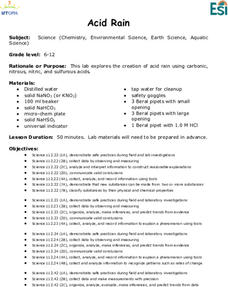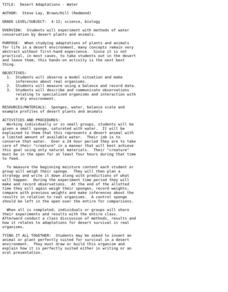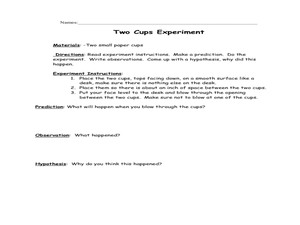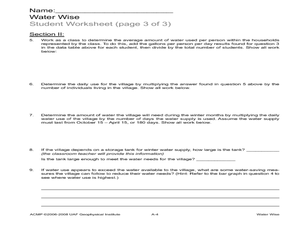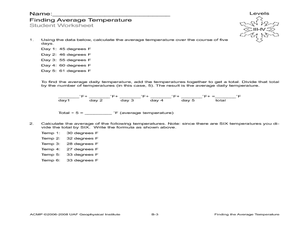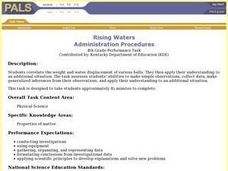Curated OER
The Spectrum of a Star
Tenth graders identify stars based on their line spectra. In this astronomy lesson, 10th graders analyze spectrograph and determine the elements present in the star. They explain the relationship between temperature and star classes.
Curated OER
Remote Sensing
Ninth graders participate in a variety of activities designed to reinforce the concept of light and the electromagnetic spectrum. They research and analyze data from remotely sensed images. They present their findings in a PowerPoint...
Curated OER
"Julie of the Wolves"
Fifth graders research life in Alaska and compare life there to their lives in this lesson. They read "Julie of the Wolves." They research through the novel and other reference books facts about the Alaskan climate and geography. They...
Curated OER
Characteristics of Living Things
Students discuss the criteria for living things with their groups. They come to a consensus on at least five or more characteristics of a living thing. They determine if the lab samples are living, non-living, or other.
Curated OER
The Beaufort Scale: A Local Model
Students study the Beaufort Scale and use it to study wind in their community. In this wind study lesson, students watch a DVD about climate change and learn about the Beaufort Scale. Students complete a worksheet for the topic.
Curated OER
Acid Rain
Students create acid rain using carbonic, nitrous, nitric, and sulfurous acids.
Curated OER
What Can We Lose? What Do We Lose as we Gain Force With A Lever?
Third graders view a demonstration of a teeter totter as a basis for assessing pre-knowledge of a lever. They create a KwL chart. Students work in small groups to conduct a variety of experiments. The first requires students to tie books...
Curated OER
Desert Adaptations: Water
Students experiment with methods of water conservation. In this water conservation lesson plan, students explore the importance of water for plants and animals in a desert biome.
Curated OER
Understanding Bernoulli's Principle
Fifth graders explain why we fly. In this space science lesson, 5th graders discuss Bernoulli's prinicple and its relation to flight.
Curated OER
Utah Archaeology
Students study past cultures of those who made areas of Utah their home by exploring the artifacts these cultures left behind. Students will explore different types of fossils and learn that fossils are evidences of past life.
Curated OER
Decision Making
Students study weather patterns and learn to make decisions based on the weather. In this weather instructional activity, students plan a potluck based on the weather. Students use a decision tree to brainstorm about the activity....
Curated OER
Layering the Air
Learners study the layer of the atmosphere. In this lesson on the atmosphere, students discuss the composition of the air around us and how the atmosphere was formed. Learners create a scale model of the layers of the atmosphere.
Curated OER
Water Wise
Students calculate their family's water consumption. In this water usage lesson, students discuss the water they use in their homes. Students complete the 'water wise' worksheets to tally their family's use of water. Students answer...
Curated OER
A Coastal Arctic Food Web
Students create a food web of the arctic ecosystem. In this biology lesson, students explain how global warming affects this ecosystem. They explain how losing a species affects the entire community.
Curated OER
What is the Function of Each Seed Part in the Growth of a Plant
Sixth graders investigate the parts of a seed by using a digital camera. In this botany lesson, 6th graders plant their own seeds in class and demonstrate the necessary attributes for growing a plant. Students utilize a...
Curated OER
Floating Pencil
Students discover how salt water makes a pencil float better than freshwater by measuring and comparing the lengths of the portion of the pencil that floats above the water surface. They then determine if an unknown water sample is...
Curated OER
Fire!, Probability, and Chaos
Young scholars explore the concept of probability. In this probability lesson, students simulate a controlled forest burn using an applet. Young scholars vary the probability of trees burning and predict what will happen.
Curated OER
Finding the Average Temperature
Students calculate averages. In this average temperature activity, students collect data and use their problem solving skills to calculate average temperatures.
Curated OER
Potential and Kinetic Energy
Sixth graders explore potential and kinetic energy. In this science lesson plan, 6th graders assume the role of a roller coaster engineer and design a roller coaster. Students use their knowledge of kinetic and potential energy to design...
Curated OER
Rising Waters
Fourth graders rank balls by size from smallest to largest and from lightest to heaviest and then by how much they made the water rise. They then discuss why certain balls make the water rise higher than do other balls.
Curated OER
Lab Report Template
Students write a paragraph (complete sentences) which explains what they did in the lab.
Curated OER
Unknown Liquids
Young scholars must design and conduct an experiment to determine which unknown liquid has a greater density based on basic information about the liquids and containers. Students are given specific materials to work with.
Curated OER
Walking on Frozen Ground
Students listen to an Elder speak about permafrost structures in their area. For this permafrost lesson plan, students listen to the guest speaker, take a tour outside to view permafrost structures, and draw them.
Curated OER
THE SCIENCE OF MUMMIES
Students explore how new advancements in technology can lead to advancements in scientific knowledge, and specifically how new technologies are advancing the study of mummies.
Other popular searches
- Observation Inference
- Observation and Inference
- Observation Inference Lab
- Observation vs Inference
- Observation Inference Demo
- Observation vs. Inference
- Observation Inference Science







